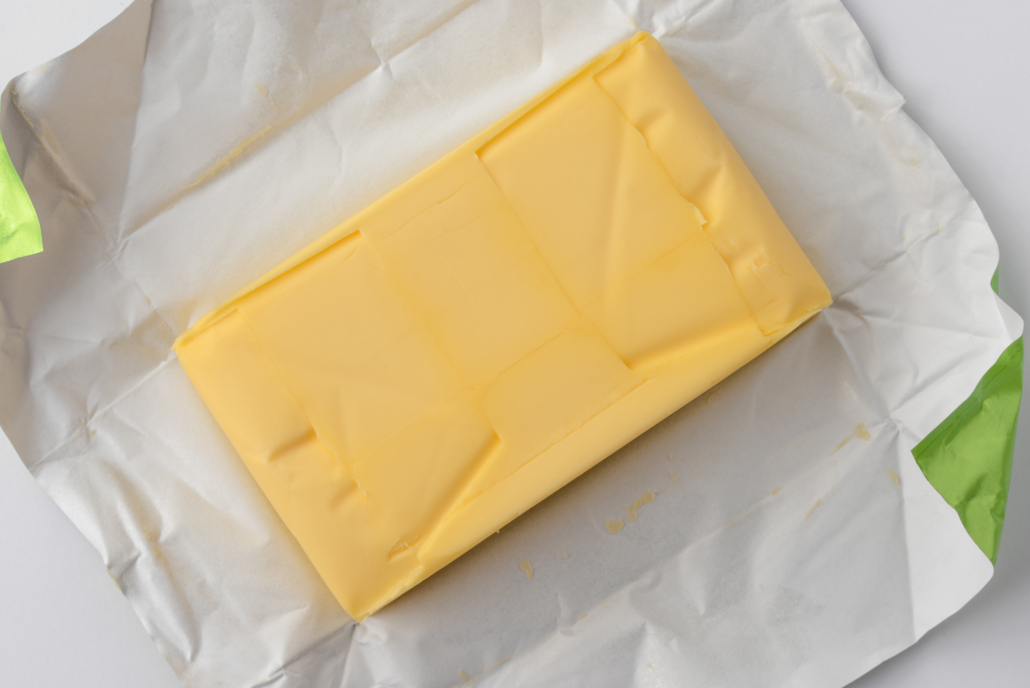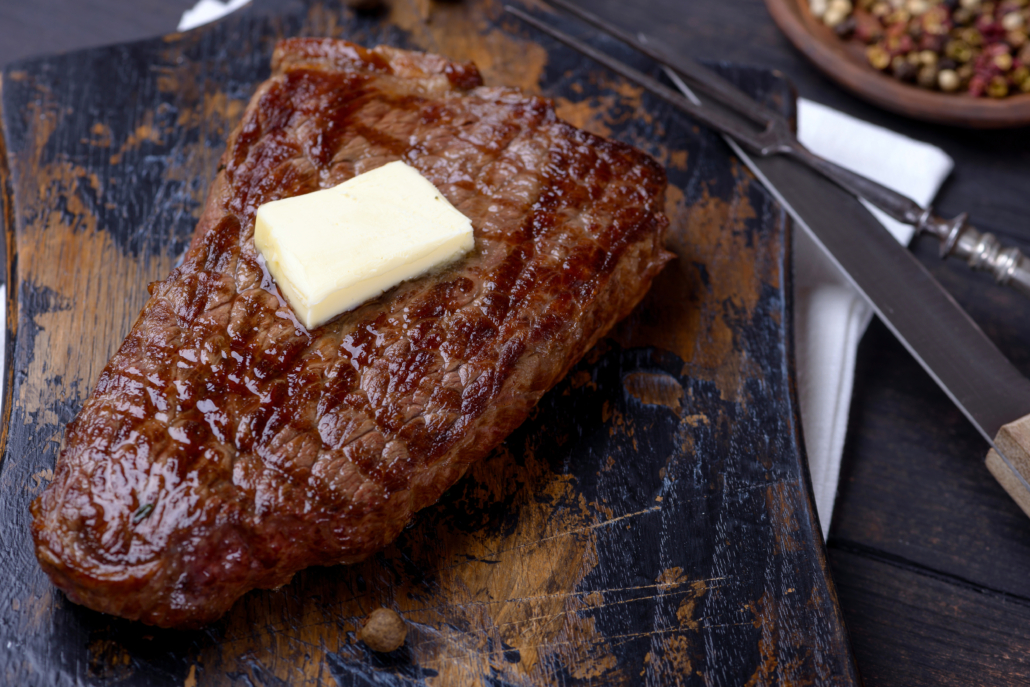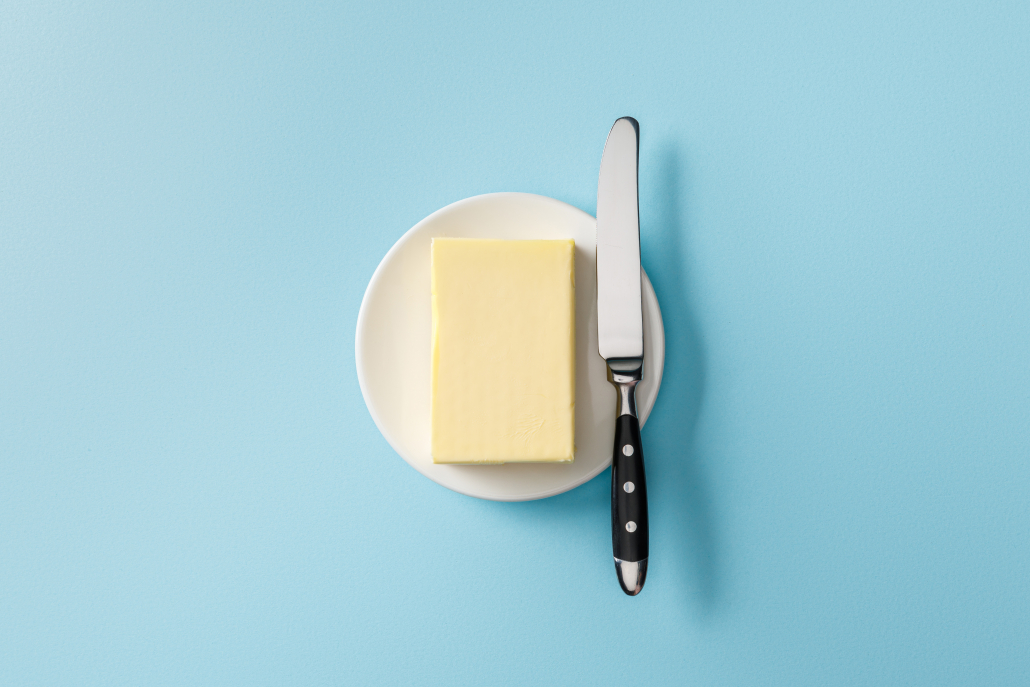We include products in articles we think are useful for our readers. If you buy products or services through links on our website, we may earn a small commission.
Ghee vs Butter: Which is Healthier?
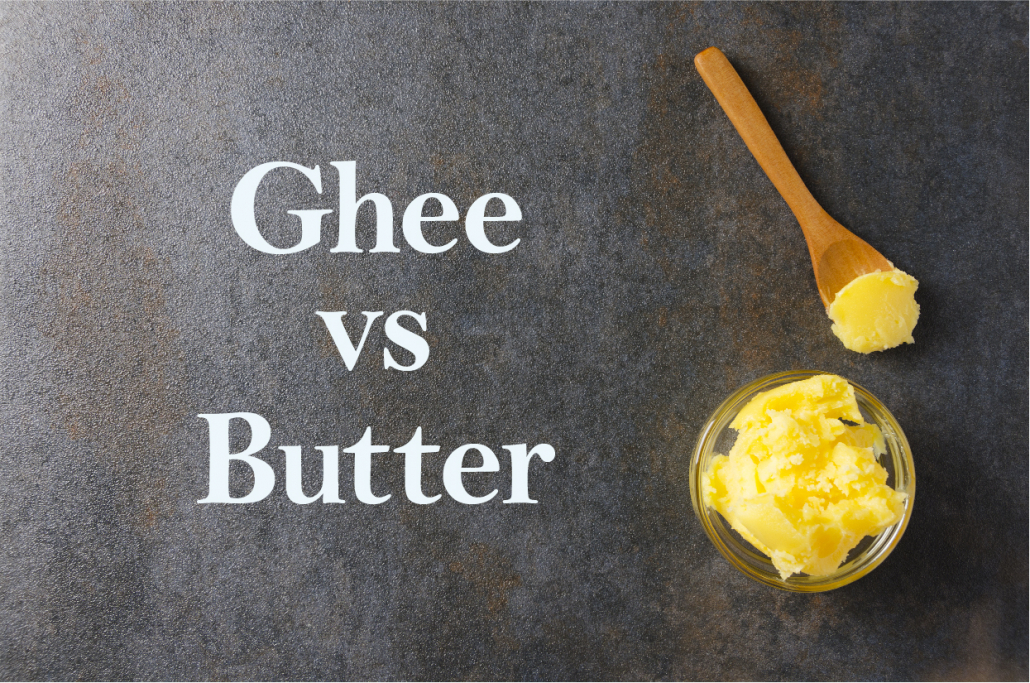
Table of Contents
Ghee is a type of butter that’s been processed to contain fewer dairy proteins. At first glance, ghee seems to be a great substitute for ‘regular’ butter, especially for people with dairy intolerance — but is it healthier?
In this article we’ll dive deep into the ghee vs. butter debate. Read on to learn about ghee and butter similarities, differences, and see which comes out on top.
The Difference Between Ghee and Butter
The difference between ghee and butter is a matter of preparation. Ghee has been clarified (basically, filtered by heat) into lower lactose, higher-fat version of butter.
Definition of ghee
Ghee is a special form of butter that’s made when regular butter is heated and separated into liquid and fat portions. Ghee is richer, has a nuttier taste, and is more oily than butter.
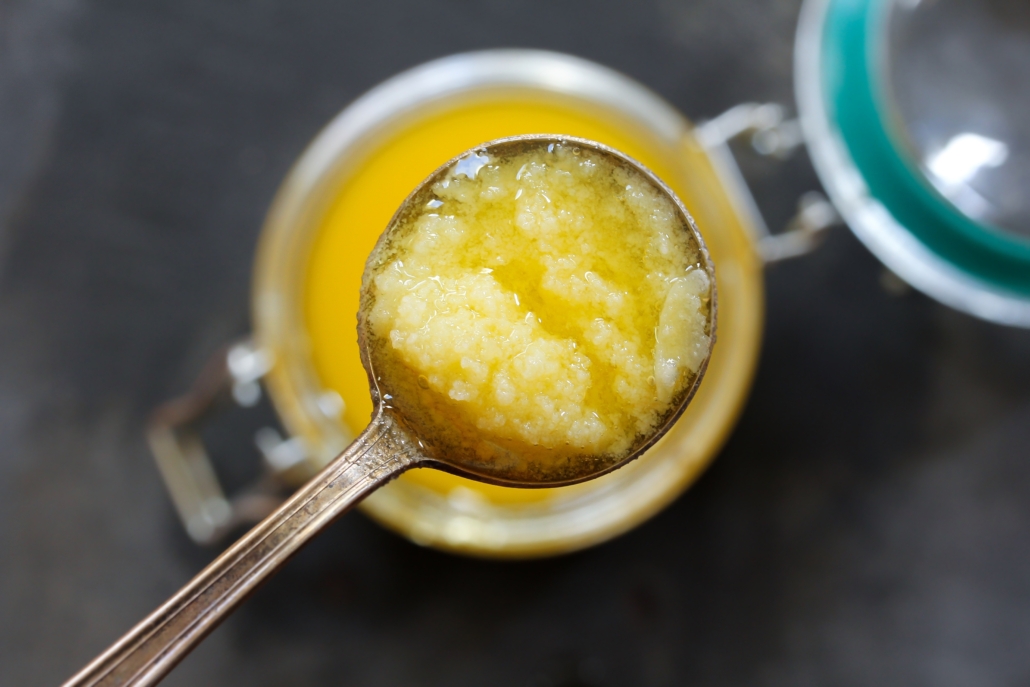
How is ghee made?
Ghee is made through the simple process of clarification.
Ghee is made by slowly simmering butter to remove its milk solids and water content. Once these are separated out, only a rich, oily product remains ghee!
Ghee’s lengthy cooking time allows it to develop a nutty caramel flavor and scent. Ghee is basically a richer, more aromatic version of butter.
You can also make ghee at home using nothing more than unsalted butter and a good cooking pan. Just melt your butter slowly, skimming off the whey solids that gather on the surface of the liquid. Eventually other milk solids will sink to the bottom of the liquid and begin browning.
Once you notice the milk solids becoming darker and more fragrant, remove the liquid from the heat. After you’ve let it cool a while, pour it through a sieve into a jar and let it fully solidify. You’ve got ghee!
Expect an 80% yield during this process, since butter is about 20% water by weight. The conversion rate and effort involved in making ghee help explain why store-bought ghee can get pricey when compared to butter.
The History of Ghee
Ghee has been known and loved among South Asian, ( Indian and Pakistani) cultures for thousands of years. These areas are known for their high centenarian populations — in some areas life expectancy rises to 90 years.
Ask these long-lived people why they remain so healthy into old age, and they’ll probably give at least some credit for all the ghee they’re eating.
In India ghee is actually a part of the ancient system of medicine called Ayurveda for its anti-inflammatory and other therapeutic properties.
In Northeast India ghee first came into being when nomads were searching for a shelf-stable butter alternative. While butter tends to turn into an impractical puddle by midday, these nomads found that ghee stayed intact (and edible) almost indefinitely.
Ghee’s popularity took off from there. It spread to Southern India (where it’s still a staple cooking fat today) before working its way around the world. Ghee became so prevalent in India that it was incorporated into the Country’s religion: chapter 9 of the Bhagavad Gita and at least one of the Rig Veda’s hymns mention ghee.
The Historical Uses of Ghee
Ancient Indian peoples soon ascribed a therapeutic power to ghee. According to traditional texts, ghee increases the digestive fire (agni) and improves the absorption of nutrients. It also nourishes the subtle essence of a person’s connective tissues (ojas).
In ayurvedic medicine, ghee has several medical applications. Some practitioners use it to treat allergies and respiratory diseases. Ghee is also an excellent delivery vessel (anupana) for transporting the active compounds in herbal preparations deep into the body.
Modern science brings a surprising amount of validation to these traditional beliefs. It turns out ghee really is a great addition to therapeutic herbs — its lipophilic nature means ghee can transport fat-soluble nutrients directly into the cell. One study found that delivering a herbal extract with ghee was more effective than using it in powder or tablet form.
What does ghee taste like?
Ghee’s taste is quite different from butter. It’s rich, toasty, and somewhat creamy. It also has a stronger aftertaste than butter. Actually, it tastes more buttery than butter does — if such a thing is possible. Imagine a healthier version of the fake popcorn butter you get at the movies. Try it for yourself and you’ll see what we mean.
Ghee vs Butter Nutrition
Ghee doesn’t contain as many dairy proteins as butter does, so it may be a better choice for people who don’t tolerate dairy products. Ghee has a few other nutritional distinctions, too, but we’ll look at the similarities first.
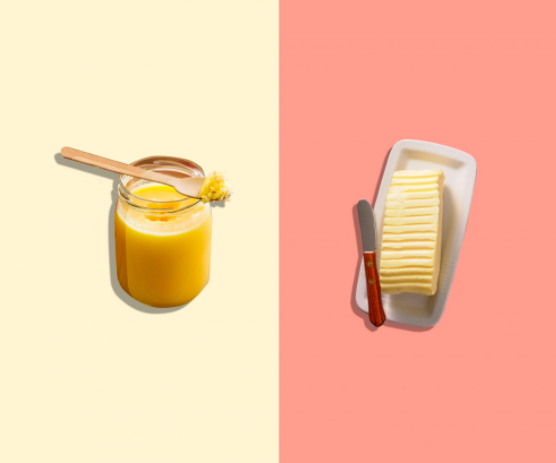
| Butter (1 tbsp) | Ghee (1 tbsp) | |
| Calories | 102 calories | 123 calories |
| Total fat | 12 grams | 14 grams |
| Saturated fat | 7.3 grams | 8.7 grams |
| Cholesterol | 31 mg | 36 mg |
| Sodium | 91 mg | 0.3 mg |
| Carbohydrates | 0 grams | 0 grams |
| Protein | 0.1 gram | 0 grams |
| Vitamin A | 97 mcg | 117 mcg |
| Vitamin D | 0 mg | 0 mg |
| Vitamin E | 0.33 mg | 0.39 mg |
| Vitamin K | 1 mcg | 1.2 mcg |
| Calcium | 3.41 mg | 0.56 mg |
| CLA (conjugated linoleic acid) | 0.038 grams | 0.038 grams |
Ghee vs. Butter: shared benefits
Both ghee and butter are rich in health-boosting, fat-soluble nutrients. These nutrients include:
- vitamin A
- vitamin D
- vitamin E
- Vitamin K2
- selenium
- Iodine
- Conjugated linoleic acid (CLA)
The vitamin A content of ghee and butter makes them both great for vision, immune function, endocrine function, and thyroid health. Better still, the vitamin A in these fats is present in a highly absorbable form.
The vitamin D in ghee and butter can strengthen your immune system and promote hormonal health. Vitamin D also enhances the absorption and uptake of calcium by your teeth and bones.
The vitamin K2 in ghee and butter may direct calcium to the right places, too, preventing the buildup of plaque in your arteries. One study found that consistent K2 supplementation reduced the progression of atherosclerosis. A similar decalcifying effect might even be seen in people who are already ‘healthy.’
Both ghee and butter are rich in conjugated linoleic acid, or CLA. This omega-9 fatty acid is associated with decreased risks of cardiovascular disease and better body composition. It also has been shown to reduce inflammation.
Finally, ghee and butter are saturated enough that consuming them can push polyunsaturated fats out of your cell membranes. This is a good thing: an excess of stored PUFA can cause oxidation, energy generation problems, and premature aging.
Ghee vs. Butter on Keto
Both ghee and butter are very keto-friendly.
Technically ghee is even more keto-friendly than butter since it contains no carbohydrates whatsoever. That being said, unless you’re eating stick upon stick of butter a day, neither ghee nor butter will really contribute to your daily carb intake.
Ghee vs. Butter for Cognition?
Ghee also shines when it comes to naturally promoting cognition. One of the many ayurvedic uses for ghee is memory enhancement. Cow ghee (goghruta) itself is viewed as an overall brain tonic, said to improve all three aspects of mental function. Ghee is also said to be helpful for promoting mental awareness.
So far Western studies haven’t managed to elucidate any ghee-cognition link, but one rodent study did find that ghee caused more weight loss than butter did.
Ghee vs. Butter Sourcing
Next up is a key similarity between ghee and butter: the source of both cooking fats matters.
A 2016 review of the available studies discovered that milk from organic cows is higher in vitamin E, iron, CLA, and other healthy fats than other types of milk. Organic milk also had a radically better (higher) omega 3:6 ratio.
These differences are also seen in grass-fed vs. conventional ghee. Considering how important the omega 3:6 ratio is for regulating inflammation, improving body composition, and boosting general health, we’d encourage you to choose grass-fed ghee if you can.
Ghee vs. Butter for Fertility
Both ghee and butter are likely great for promoting natural fertility, but this is yet another area where ghee deserves a special mention.
Ghee contains many of the nutrients needed to boost fertility — so much so that ghee and other full-fat dairy products may reduce infertility by over 50%.
In Indian mythology, it’s believed that Prajapati, the Lord of creatures, generated his offspring by pouring ghee into a fire. To this day, men at Hindu weddings have a ghee-eating ‘contest’ to boost their fertility.
What About the “Danger” of Dairy Fat?
Ghee is about 48% saturated fat by calorie. Its high saturated fat content has led some people still living in the fat scare of the 1990s to wonder if ghee is contributing to cardiovascular disease.
The idea that saturated fat is bad because it raises cholesterol, however, is not grounded in science. A 2010 meta-analysis of 21 studies involving nearly 350,000 people found that saturated fat consumption was not associated with stroke, heart disease, or other problems commonly attributed to saturated fat.
Ghee consumption doesn’t even raise cholesterol levels in normal rodents fed a 5-10% ghee diet. The study’s authors stated that traditional ghee isn’t to blame for India’s growing cardiovascular disease rates: “Factors that may be involved in the rise of [cardiovascular disease] in Asian Indians include the increased use of vanaspati (vegetable ghee) which contains 40% trans fatty acids, psychosocial stress, insulin resistance, and altered dietary patterns.”
Finally, a 2018 study of 200 people in India found that those who ate more ghee and less vegetable oil had healthier serum lipid markers.
All in all, the research makes it clear that the saturated fats found in grass-fed dairy products — including both ghee and butter — are cardioprotective.
Why use ghee instead of butter?
The choice to use ghee or butter in your cooking is ultimately up to your personal taste preference (and you can always use both). That being said, below are three things that might swing you over to the ghee side.
Reason #1: It’s better for higher-temp cooking.
Ghee can be used in all the same ways you’d use butter or coconut oil — and then some.
Ghee is perfect for high-temp cooking. Its smoke point is 465°F (80° higher than any other cooking oil) and it can withstand temps of up to 485°. You can fry eggs, beef, or veggies in ghee without having to worry about any unwanted smokiness.
Since ghee is free of milk proteins and sugars, it’s less easily oxidized or ‘burned’ during cooking. Studies show that ghee produces less acrylamide, a potentially cancerous compound, than other cooking fats/oils.
Reason #2: It’s tastier.
Ghee can be an acquired taste — but once you acquire it, you might just prefer it over butter.
Even if you decide you like ghee and butter about equally, they say that diversity is the spice of life, right? Ghee can be a welcome addition to just about any keto/carnivore diet.
You might even come to love ghee’s nutty, smoky flavor enough to relate to the Rig Veda’s near-mythical description of it as “the tongue of the gods” and the “navel of immortality.”
Reason #3: It’s less allergenic.
Ghee’s lack of milk proteins (whey) and sugars (lactose) also makes it ideal for people who normally struggle with dairy products. Many people with lactose intolerance find that they can tolerate ghee just fine.
All in all, ghee is remarkably easy to digest and absorb for people of all ages and health backgrounds.
The takeaway: Ghee vs. Butter
Ghee and butter both have many strengths and few weaknesses. If you’re big on high-temp cooking or lactose intolerant, then ghee is the better choice. If you can’t find high-quality ghee near you, however, you can’t go wrong with butter.
So, which one is healthier?
Considering that both ghee and butter are nourishing, healthy foods…
…we’ll just say that the healthier option is whichever one you’re most likely to eat.













